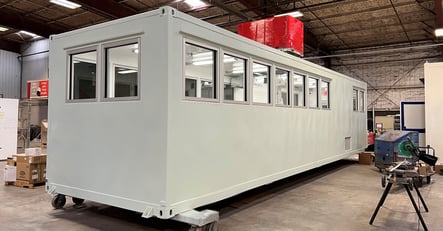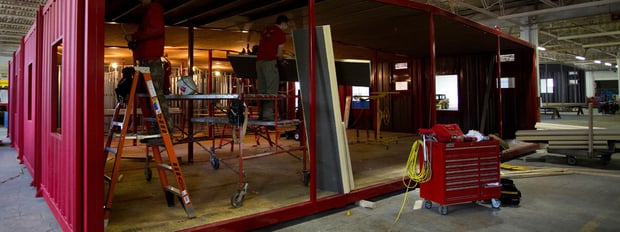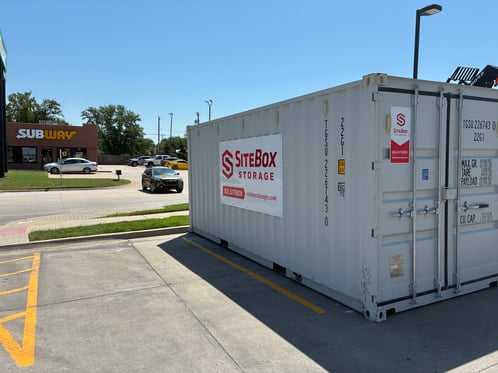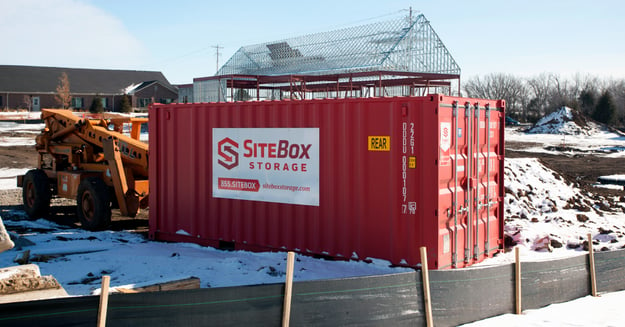Why Rent an Onsite Storage Container?
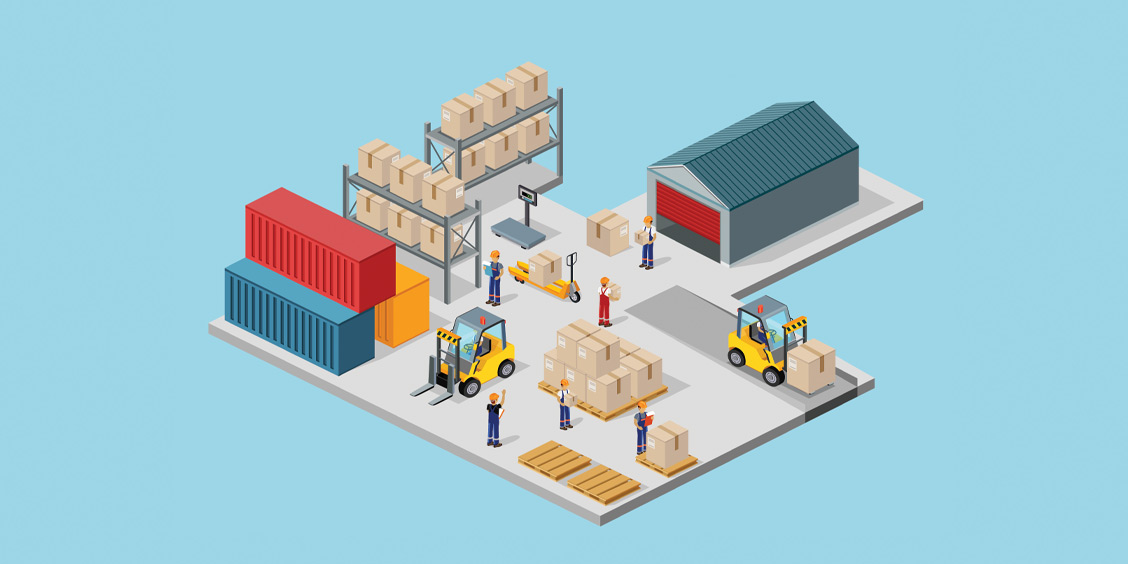
Look, we hear this question all the time: should I actually rent one of these storage containers, or am I overthinking this? Honestly, most of the time the answer is yeah, you should. Whether you're running a construction crew, moving your office, or you're a retail shop drowning in inventory, storage containers have basically become the standard way to handle this stuff.
But here's the catch, not every storage situation is the same. Some jobs just need a quick trailer you can hook to a truck. Some benefit from keeping everything offsite. But when you need something secure and accessible right there where you're working? That's when a storage container just makes sense.
Understanding Your Storage Container Options
So you're looking at storage containers. There are basically three sizes: 10-foot, 20-foot, and 40-foot models.
The 10-footer is the smallest, about 539 cubic feet inside. This size is perfect if you've got tools, materials from a single room, or supplies from a smaller project. The 20-foot container is where most people land. It's got plenty of room without looking ridiculous on your property or jobsite. Then there's the 40-footer, the beast. This is what you grab when you're doing a major renovation, running a big construction site, or storing vehicles, inventory, and heavy equipment.

A lot of companies will customize these too. You can add shelving, racks, lighting, whatever. It depends on what you're storing and how you want it organized.
How Much Space Do You Actually Need?
This is where most people screw up. They always, and I mean always, underestimate how much room they need. If everything's boxed and stacked neatly, you don't need extra space. But if you need to dig through stuff or move things around constantly, you're gonna want room to maneuver.
Here's my honest advice: if you're sitting on the fence between two sizes, just go bigger. The extra monthly cost is nothing compared to the pain of overfilling one container or having to rent a second one. And I promise you, literally everyone underestimates their storage needs. Get the bigger size and thank yourself later.
Determining Your Rental Duration
How long you actually need the container matters way more than people realize. Most rentals work on a 28-day cycle, which is perfect for a lot of construction and business projects. But your timeline might be totally different.
Real construction and renovation projects almost never finish in just four weeks. They go longer. And then you've got final inspections, punch-list stuff, all that. Some projects need a container for months, some just a few weeks. The good news? Most rental companies are pretty flexible about extending. On average, people keep containers for about 9 months, but some are way shorter and some go on for over a year.
Security: A Major Advantage of Onsite Storage
Let's be real here. Jobsite theft and vandalism happen. Copper wiring, tools, electrical stuff, materials—there's serious money in what sits on a typical worksite. That's why about 22% of businesses now rent storage containers, the security is a huge part of it.

Shipping containers are genuinely one of the most theft-resistant and vandal-proof storage options out there. They're made from heavy steel with locks that aren't easy to break into. Unlike trailers or just leaving stuff sitting around, a locked container actually protects your tools, equipment, materials, and inventory from people who want to steal it.
With a container right on your property, your stuff is protected from theft, weather, and vandalism. And you can get to it whenever you need it. That's the best-case scenario.
The Convenience Factor That Sets Onsite Storage Apart
This is actually the biggest reason people love onsite storage containers: convenience. Everything you need is literally right there. No driving across town, no facility hours to worry about, no logistics headaches.
If you're storing supplies somewhere else, you're either making constant trips to grab what you need, or waiting for someone to bring it to you. That's time you're not working. With a container on your property, you walk out and grab it. Whenever. 3 AM or 3 PM, doesn't matter. This is huge for construction crews, retail businesses with too much inventory, companies renovating offices, anyone who needs quick access to their stuff.
Logistics: Placement and Accessibility
Before you commit to anything, have an actual conversation with the rental company about where they'll put the container. You need enough room for delivery trucks to actually drop them off without issues.
Think about your workflow too. How often are you going in and out? The more frequently you're accessing it, the more the placement matters. A container wedged in a weird spot can turn something simple into an annoying daily hassle. Here's the good news—most companies will move it if your needs change during the project. Just ask upfront what that looks like and what it costs.
Cost Considerations for Renting Storage Containers
Let's talk money because that matters. Renting an onsite storage container costs about 15% less than a regular self-storage unit, which is solid savings. The actual price depends on what size you're getting, how long you need it, and where you are.
A 10-footer is cheaper than a 20-footer, which is cheaper than a 40-footer. If you want extras like shelving, lighting, or climate control, that adds to the cost. Some companies include delivery and pickup in the rental price, some charge based on how far away you are from their facility.
The onsite storage container rental market is projected to hit $3.8 billion by the end of 2025, which tells you there's a lot of competition out there. That's good for you—it means you can shop around for decent rates and actual good service in your area. Get quotes from a few different companies. Don't just look at the monthly price—check what's included. Quality matters when you're trusting a company with your tools, equipment, and valuable inventory.
Popular Service Areas and Geographic Flexibility
You can rent onsite storage containers pretty much everywhere across the country. Whether you're in California, Oklahoma, Texas, San Jose, Oklahoma City, Dallas, or somewhere else entirely, rental companies have established networks and service centers.
Some companies specialize in specific regions or cities. You're in a major metro area? You'll have plenty of options. Smaller towns might have fewer choices, but most places have at least some access to these services. When you're picking a rental company, make sure they actually operate in your area and can deliver when you need them.
Common Uses Across Different Industries
These containers aren't just for construction sites. All kinds of businesses and situations use them as their go-to storage solution. Construction companies use them for tools, materials, and equipment on job sites. Retail stores rent them when their warehouses fill up with inventory. Moving companies use containers to store belongings during relocations. Office spaces use them during renovations. Over 68% of construction sites in urban areas now use onsite storage containers for managing equipment and materials. It's basically standard practice at this point.
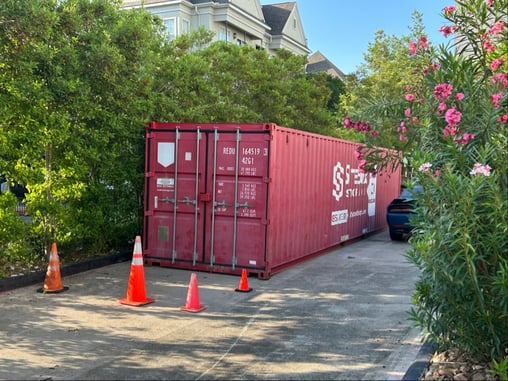
Finding the Right Rental Company
Not every rental company is the same. When you're comparing your options, pay attention to whether they have a good variety of containers in decent condition, service your area, have solid reviews, are upfront about pricing, and actually respond when you need them.
A good rental company will walk you through the whole process. They'll help you figure out what size you actually need, talk through placement, answer your questions, and be honest about costs from the start. Look at real customer reviews. Ask around about their experience with delivery, the condition of the containers, how responsive the company is. Online reviews give you a pretty good picture of what a company is actually like.
Frequently Asked Questions About Onsite Storage Containers
What exactly are onsite storage containers? They're portable steel boxes that sit right on your property or jobsite. You fill them with tools, equipment, materials, inventory, furniture, or belongings. They're locked, weather-resistant, and designed to protect your stuff.
How do I rent an onsite storage container? You call a rental company, tell them what size you need and where you are, and pick a delivery date. They drop it off, you fill it whenever you want, and when you're done, they pick it up. From your first call to delivery usually takes just a few days.
What sizes are available? Most companies have 10-foot, 20-foot, and 40-foot options. Some offer high-cube models (taller than standard) and customized versions with shelving, lighting, or climate control.
How much does it cost? It depends on the size, how long you need it, and your location. You'll typically save about 15% compared to regular self-storage. Get a few quotes to compare.
Are there delivery fees? Some companies roll delivery and pickup into the monthly price. Others charge based on distance. Always ask for a complete quote before you commit.
What can I store? Pretty much anything that isn't hazardous or flammable. Tools, equipment, furniture, belongings, inventory, office supplies, vehicles, boats, materials, documents—all good.
How long can I rent? As long as you need it. Most work on a 28-day cycle, but you can extend as long as you want. The average rental is about 9 months.
Do they have security features? Yeah, totally. They're made from heavy steel with reinforced doors and solid locks. They're weather-tight and vandal-proof. Some companies offer extras like motion-activated lights or better locks.
Can I access my stuff anytime? Yes. It's on your property, so you can get to it whenever you need it. No facility hours, no restrictions. 24/7 access.
What are the benefits? Convenience (it's right there), security (weather-proof and theft-proof), flexibility (rent as long as you need), cost savings (about 15% cheaper), and access (24/7). You don't make constant trips to some storage facility miles away, and your stuff actually stays protected.
Making Your Decision
At the end of the day, renting an onsite storage container comes down to whether it actually fits your situation. Do you need secure, accessible storage right where you're working? Do you want to avoid the nightmare of managing an offsite facility? Are you looking for something affordable that gives you flexibility?
If you're nodding yes to any of those, onsite storage containers are probably your answer. The combination of security, convenience, affordability, and access makes them one of the most practical storage solutions that exist. Talk to a rental company about what you actually need, get a quote, and see if it works for your situation.
By the way, construction sites aren’t the only location that secure mobile storage is needed. There are a lot of creative uses for renting a cargo container storage unit, many times containers are used for retail storage!
